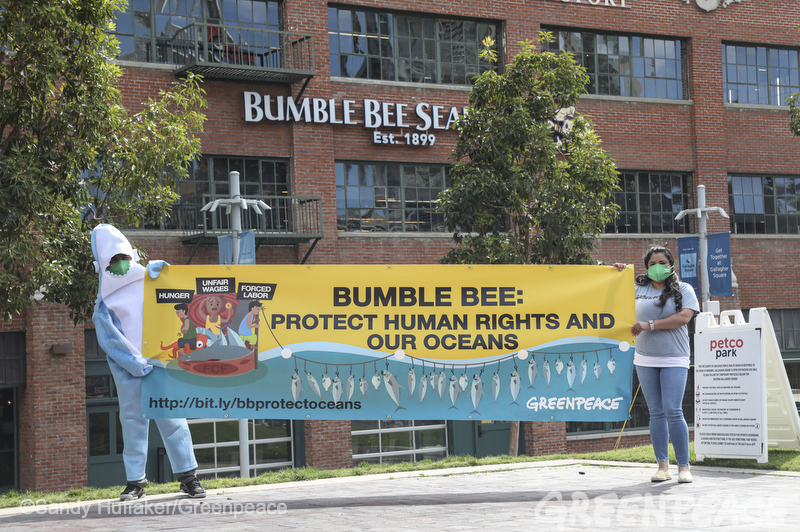Washington, DC (September 9, 2023) – A class-action lawsuit has been filed against Bumble Bee Foods and Conagra Brands over sustainability claims the companies have made regarding their seafood products. Two complaints, filed in the federal district courts, in the U.S. states of Illinois and California, each seek at least $5 million dollars in damages. The complaint cited Greenpeace East Asia’s research into Bumble Bee’s practices, which found that environmental harm and human rights violations were present in the company’s supply chain.
Marilu Cristina Flores, Senior Oceans Campaigner at Greenpeace USA, said: “Consumers deserve transparency when purchasing what they believe to be sustainable and ethical seafood. We hope this lawsuit leads to urgent and comprehensive reform in an industry notorious for its harmful environmental practices, human rights violations, and lack of transparency. Bumble Bee, as one of the leading companies in the canned tuna market, has the power to impact the health of our oceans and the lives of fishers at sea. But for years, they have failed to take the full measure of their responsibility. It is time to hold them accountable.”
The report “Fake My Catch – the unreliable traceability in our tuna cans” sheds light on illegal, unreported, and unregulated fishing (IUU), its environmental destruction, and how forced labor is reinforced through its practice. Published in 2022 it found that over 10% (13) of the 119 sampled Taiwanese-flagged/owned vessels that supplied Bumble Bee had previously violated Taiwan Fishery Agency regulations and were on their Illegal, Unreported, and Unregulated (IUU) list. The report presents interviews revealing that some vessels supplying Bumble Bee reportedly engaged in shark finning and illegal fishing. It includes statements by several fishers who worked aboard vessels supplying Bumble Bee of excessive overtime hours while having their wages withheld. Particularly alarming was the discovery of a canned Bumble Bee product at a Harris Teeter grocery store in Arlington, Virginia, which contained fish sourced from the Da Wang — a vessel that was confirmed by US Customs & Border Protection to have employed forced labor, prompting questions about whether tainted products are on US supermarket shelves. Greenpeace USA, through its tuna retailer scorecard, continues to encourage grocery stores not to stock Bumble Bee tuna. But many, including Kroger (which owns Harris Teeter), still do.
Mallika Talwar, Senior Oceans Campaigner at Greenpeace USA who participated in an action calling out the company at Petco Park Stadium in San Diego near the company’s headquarters, said: “Bumble Bee positions itself as dedicated to “sustainable fishing” and advocates for fishers, and says their products are “Good For You.” But given the suspected environmental harm and human rights violations in their supply chain, we must ask, “Good for who?” That isn’t good for anyone — not the vulnerable fishers who face harm or death, nor Americans who expect companies like Bumble Bee to ensure their products were not made with forced labor, and certainly not for our oceans and our planet. We call on Bumble Bee to put our planet and people before their profits and clean up their supply chains.”
High-seas fisheries was a highly debated area of the negotiations for the historic global ocean treaty which countries agreed to on March 4, after almost 10 years of negotiations. The Treaty, hailed as the biggest conservation agreement in the history of the world, provides a pathway to establish a network of marine sanctuaries across the globe— areas where fragile ecosystems and depleted populations of marine life can recover and thrive. The treaty must be ratified by 60 countries to take effect. Greenpeace USA has called on the Biden Administration to lead the way by ratifying this treaty quickly and working to implement real protections at sea.
###
Photo and videos of the action in San Diego are available here.
Copy of Complaint available here.
Contact: Tanya Brooks, Senior Communications Specialist at Greenpeace USA, (+1) 703-342-9226, [email protected]
Greenpeace USA is part of a global network of independent campaigning organizations that use peaceful protest and creative communication to expose global environmental problems and promote solutions that are essential to a green and peaceful future. Greenpeace USA is committed to transforming the country’s unjust social, environmental, and economic systems from the ground up to address the climate crisis, advance racial justice, and build an economy that puts people first. Learn more at www.greenpeace.org/usa


